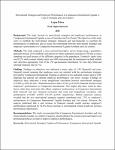| dc.description.abstract | Background: The study focused on motivational strategies and employees’ performances in
Compassion International Uganda, a case of Amolatar and Lira Cluster. The objectives of the study
were; to establish the motivational strategies (financial and non-financial), to ascertain the
performances of employees and to assess the relationship between motivational strategies and
employee’s performances in Compassion International Uganda Amolatar and Lira clusters.
Methods: The study employed a cross sectional descriptive survey design using a quantitative
approach because of its reliability and objectivity Study population consisted of 150 and a census
sampling was used because of the different categories in the population, Cronbach’s alpha value
was 83.2% while content validity index was 100% indicating that the instrument was both reliable
and valid thus appropriate. Out of the 150 questionnaires distributed, 94 were duly filled and
returned (response rate 62.7%).
Findings: Findings on objectives one indicated a mean value of 1.99 (financial) and (non financial) reward meaning that employees were not satisfied with the motivational strategies
provided by Compassion International. Findings on objectives two indicated a mean value of 2.80;
implying that general sub optimal employee performances was below average. Findings on
objectives three indiciated a weak insignificant correlation between motivational strategies
(r=0.085, p>0.05) for non – financial incentives and (r=0.165, p>0.05) for financial incentives and
employees’ performances in Compassion International. This implies that there could be other
factors other than motivation that affects employee’ performances at Compassion International
Both financial and non- financial motivation had weak and insignificant correlation with
performances (r=0.085, p>0.05; r>0.165, p>0.05, respectively). Robust regression analysis
revealed that the two motivational strategies together contributed only 7.5% to employee’s
performances in Compassion International Uganda Amolatar and Lira cluster. However, the
analysis predicated that a unit increase in financial rewards would increase employee’s
performances significant by 54.8% but an increase in non-financial reward would not increase
performances significantly.
Recommendations: The study recommended that Compassion International Amolatar and Lira
cluster should consider, as a matter of urgency, should enhance the reward system and improve on
promotional policies in order to improve employee performances.
Keywords: Motivational Strategies, Employee Performances, Compassion International Uganda | en_US |

